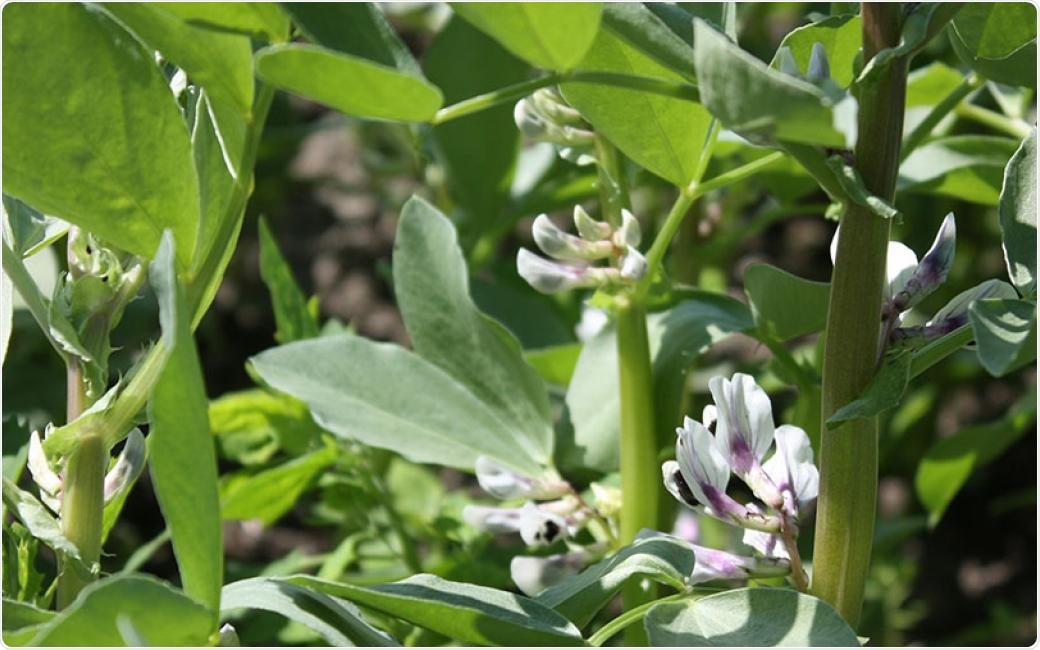Since prehistoric times, faba beans have been a good source of food protein. However, roughly 5% of the population is unable to consume them. An international team of experts has now found the gene that causes the toxic vicine and convicine to be produced.

Blooming faba beans. Image Credit: Fred Stoddard.
The gene responsible for the synthesis of vicine and convicine, which are toxic to these people, has been identified by an international team of researchers, headed by the Universities of Helsinki and Copenhagen, as well as Luke Natural Resources Institute Finland. The team writes in Nature Plants that the VC1 gene plays a critical role in the biological production of these chemicals.
Faba beans were avoided by Pythagoras and his disciples, and they were associated with death by Roman priests of Jupiter. Today, it is known that faba beans produce the anti-nutrients vicine and convicine, which put vulnerable people at risk for favism (a disorder caused by the destruction of red blood cells).
Plant chemicals known as anti-nutrients inhibit the body’s capacity to absorb critical nutrients. Faba beans have the second highest output among legumes (the pod-producing family of plants that also includes pea, bean, chickpea, and soybean).
They also have the greatest seed protein concentration among the starch-containing legumes, outperforming soybean in cool areas. As a result, faba beans are a key protein source for promoting a global shift to a plant-based diet, which is thought to be necessary for large carbon emission reductions.
When patients without a certain enzyme consume a substantial amount of raw faba beans, however, the vicine and convicine can cause their red blood cells to explode. The resulting hemolytic anemia, known as favism, has inevitably reduced the faba bean’s potential use.
Despite the fact that there are several faba bean variants with low levels of vicine and convicine, the gene responsible for this feature was not identified earlier.
It seems that the ancient Greeks and Romans must have been aware of the occasional serious illness caused by faba beans. It took until today to unlock the secret of that risk.”
Alan Schulman, Project Leader, Luke and University of Helsinki Lab
The gene responsible for vicine-convicine content has now been identified by the researchers. Furthermore, the specific mutation inside this gene that causes the reduction in synthesis has been identified.
All faba bean types with a low vicine-convicine content descended from a single accession located in a genebank, according to the researchers. Within the VC1 gene, two nucleotides—the “letters” that constitute the DNA—were added. The sole known genetic source of reduced vicine and convicine content is this insertion, which affects VC1 function.
A promise of a sustainable protein-rich food that everyone can eat
This study sets the stage for a thorough description of the vicine and convicine biosynthesis pathways, as well as the breeding, manufacture, and commercialization of faba bean varieties free of these anti-nutritional chemicals. The team, which includes prominent scientists from Denmark, Finland, Germany, the United Kingdom, and Canada, is already looking ahead.
Faba beans are an old crop, and now offer new promise as a sustainable protein-rich food that everyone can eat.”
Fred Stoddard, Project Leader, University of Helsinki
Source:
Journal reference:
Björnsdotter, E., et al. (2021) VC1 catalyses a key step in the biosynthesis of vicine in faba bean. Nature Plants. doi.org/10.1038/s41477-021-00950-w.